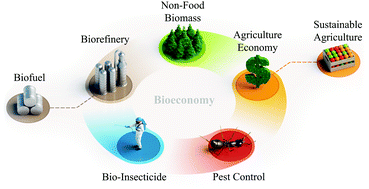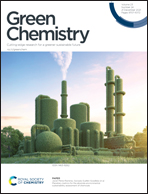Efficacy, economics, and sustainability of bio-based insecticides from thermochemical biorefineries†
Abstract
The scope of this work rests at the interface between food and energy sustainability. Thermochemical conversion of biomass is an attractive strategy for the production of low-cost biofuels, and bio-based insecticides are a more sustainable and often safer alternative for pest management in agricultural production. This work demonstrates a complimentary strategy to access both biofuels and a bio-based insecticide through a catalytic fast pyrolysis process. Technoeconomic modeling shows the bioinsecticidebio-based insecticide can be produced at a cost ≤1.7$ per kg while fully formulated bioinsecticidebio-based insecticides typically sell for ≥6$ per kg, which can significantly reduce the biofuel selling price. Supply chain analysis shows a 46–88% reduction in green-house gas emissions for this agrochemical can be achieved. By using insecticidal activity data from two well-known crop pests, spotted-wing drosophila (Drosophila suzukii, Matsumura) and oriental fruit moth (Grapholita molesta, Herbst), with an analytical analysis, which achieved ≥99% mass balance closure on the thermochemically derived distillate product, a structure–function relationship between phenol alkylation and insecticidal activity is proposed. An ecotoxicological assessment of the bio-based insecticide was performed using existing data and prediction tools across 18 metrics. It is estimated that a 2000 tonne per day biorefinery can supply 1–5% of the market, which is typical for other moderately scaled chemicals. The mixture of alkylated phenols, used as a bio-based insecticide, is an ideal coproduct that overcomes separation challenges associated with thermochemical streams, such as heterogeneity and reactivity, while providing a more sustainable source for agrochemicals. Synergistic strategies for energy and food production, such as coproduction of bio-based insecticides with biofuels, can be a viable approach to improve sustainability in both sectors.



 Please wait while we load your content...
Please wait while we load your content...